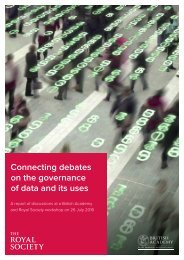BIG DATA
VodafoneInstitute-Survey-BigData-Highlights-en
VodafoneInstitute-Survey-BigData-Highlights-en
Create successful ePaper yourself
Turn your PDF publications into a flip-book with our unique Google optimized e-Paper software.
<strong>BIG</strong> <strong>DATA</strong> – opportunities AND RISKS<br />
Scenarios<br />
Digitisation has long since penetrated a wide variety of<br />
mobility concepts, and our vehicles produce ever larger<br />
quantities of data. From automotive manufacturers, suppliers<br />
of positioning services and tour operators to public<br />
authorities: they all use data aggregation and analysis to<br />
generate their offers and innovations. The respondents<br />
support the innovative opportunities depending on the<br />
personal benefit to themselves, although their agreement<br />
to this is somewhat cautious.<br />
43 percent of respondents could envision the idea of<br />
improved service from automotive manufacturers based<br />
on their own driving behaviour and the condition of the<br />
car. Above all people from Spain stand out as particular<br />
advocates of this idea, with two thirds of the Spanish<br />
respondents feeling comfortable with the scenario<br />
(67 percent), while less than a quarter of Germans take<br />
to the idea (22 percent).<br />
27<br />
of people would feel comfortable<br />
with insurances using their data<br />
to make individual offers based<br />
on driving behaviour.<br />
Navigation systems suggesting optimised routes on the<br />
basis of the driver’s own mobility data and that of other<br />
people are meanwhile common across Europe. This is<br />
accepted by more than half of the respondents (55 percent).<br />
On the other hand, there is somewhat less support for<br />
data being passed on to public authorities to improve<br />
traffic situations, with only 45 percent of respondents<br />
agreeing with this. While Italians (61 percent) and Spaniards<br />
(58 percent) are especially enthusiastic about this<br />
concept, Germans in particular display a much lower level<br />
of agreement (26 percent).<br />
The use of personal data for identifying traffic violations<br />
finds many more opponents than advocates. Less than<br />
a third of respondents feel comfortable with this idea<br />
(29 percent), while in contrast half are negative and 20<br />
percent claim that this use by the police should not be<br />
permitted. Here too it is primarily Italians (47 percent)<br />
who are open to the idea, while Germans show the lowest<br />
acceptance with 13 percent agreement.<br />
The possibility of passing personal traffic data on to<br />
insurers so they can adjust their premiums meets with similar<br />
dislike. Almost half of the respondents voted against<br />
this, with 16 percent advocating that this should not be<br />
allowed.<br />
When it comes to the sale of personal traffic data to<br />
third parties, respondents displayed the lowest acceptance<br />
(eleven percent agreement), even if data is anonymised<br />
and aggregated. Two out of five (41 percent) called<br />
for this to be banned, and over a third (37 percent) feel<br />
uncomfortable with this.<br />
Going<br />
from one place to another is easier with a<br />
map that shows you what the traffic is like<br />
and helps you change your route… that<br />
might make driving around the city easier.“<br />
Participant focus group qualitative survey<br />
26






